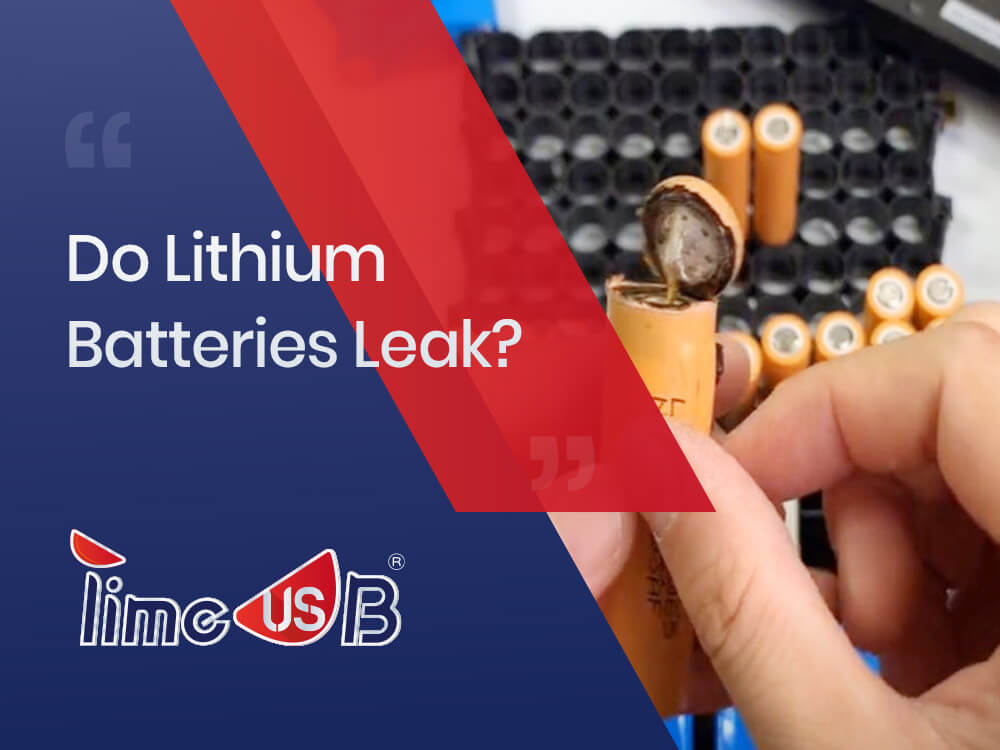Do Lithium Batteries Leak? Unveiling the Truth and Tips for Safe Handling

Lithium batteries have revolutionized the way we power our devices, from smartphones to electric vehicles. Their compact size and impressive energy storage capabilities have made them incredibly popular. However, concerns about safety, especially their tendency to leak, have remained a topic of interest.
In this article, we'll explore the reality of lithium battery leaks and provide you with valuable tips for safe handling.
Do Lithium Batteries Leak?
Lithium-ion batteries are generally safe and have a low risk of leaking. However, like any battery, there is still a small possibility of leakage, so it's important to take precautions to minimize this risk. It's crucial to ensure that the voltage supplied by the battery is suitable for the equipment being used and that the device can handle the battery's voltage.
Lithium batteries are great for providing long-lasting power to gadgets, and leaving them plugged in for extended periods of time does not affect their functionality. Unlike alkaline batteries, lithium batteries do not release gas when exposed to high pressure and dampness.
To prevent leaks, it is necessary to handle lithium batteries properly. They should be kept in a dry and cool place, with a charge level between 50 and 70 percent when stored. It's important to choose reliable manufacturers, avoid physical damage to the batteries, use appropriate charging equipment, and dispose of damaged batteries correctly.
Overall, with proper use and care, lithium batteries are safe to use. Their portable nature and reliability have made them widely adopted in various applications. They are generally leak-proof under normal conditions.
What Causes Lithium Battery to Leak?
Lithium-ion batteries are generally designed to be leak-proof under normal conditions. However, there are a few factors that can potentially cause leaks:
Physical Damage
If a lithium-ion battery is physically damaged, such as being punctured or crushed, it can lead to leakage. Damaged batteries should never be used and should be disposed of properly.
Manufacturing Defects
In rare cases, manufacturing defects can result in faulty seals or improper assembly of the battery, leading to leaks. This is why it's important to choose reputable manufacturers and avoid counterfeit products.
Overcharging
Overcharging a lithium-ion battery can cause it to become unstable and potentially leak. Using approved charging equipment and avoiding overcharging is crucial to prevent such situations.
Exposure to Extreme Temperatures
Extreme temperatures, both high and low, can affect the integrity of the battery and potentially cause leakage. It is important to store and use lithium-ion batteries within the recommended temperature range to maintain their safety.
Aging
Over time, lithium-ion batteries can degrade and lose their ability to hold a charge. As they age, the risk of leakage may increase.
It's worth noting that while the risk of leaks is low, it's important to take precautions to minimize any potential risks associated with lithium-ion batteries.
How to Prevent Lithium Batteries from Leaking?
To prevent lithium batteries from leaking, here are some guidelines to follow:
Choose reputable brands
Purchase lithium batteries from trusted manufacturers like Timeusb who have a track record of producing high-quality and reliable batteries.
Proper storage
Store lithium batteries in a cool, dry place away from direct sunlight and extreme temperatures. Ideally, the temperature should be between 15-25°C (59-77°F). Avoid storing them in humid or hot environments.
Prevent physical damage
Avoid dropping or subjecting lithium batteries to impact or physical stress, as this can damage the battery casing and lead to leakage.
Use appropriate charging equipment
Always use the charger provided by the battery manufacturer or a compatible charger recommended for the specific battery type. Using incompatible chargers may cause overcharging, overheating, and potential leakage.
Avoid overcharging
Do not overcharge lithium batteries as it can lead to the release of gases, electrolyte breakdown, and potential leakage. Once the battery is fully charged, unplug it from the charger.
Replace damaged batteries
If you notice any signs of physical damage, such as a bulging or leaking battery, replace it immediately. Do not attempt to use or charge damaged batteries.
Follow device-specific guidelines
Different devices may have specific requirements for the type of lithium battery to be used. Follow the manufacturer's guidelines and recommendations when selecting and using batteries for specific devices or applications.
Proper disposal
When disposing of lithium batteries, do not throw them in the regular trash. Instead, take them to designated battery recycling centers or follow local regulations for battery disposal.
By following these precautions, you can minimize the risk of leaking and ensure safe use of lithium batteries.
The Possible Reasons to Cause Different Types of Lithium Batteries to Leak
1. Cylindrical Lithium Battery
In the case of cylindrical lithium batteries, two main reasons for leaks are excessive internal pressure and inadequate external packaging.
Battery Manufacturing Process
During the battery manufacturing process, the following issues can lead to battery leakage:
- Insufficient or faulty welding of the battery shell and cap, resulting in unsealed welding points or cracks in the welds.
- Improperly sized or mismatched material used for the sealing steel ball, which is supposed to tightly seal the battery.
- Loose or poorly riveted positive electrode on the cap, causing gaps and unsuitable elasticity of the insulating gasket, which is also prone to corrosion and aging.
Battery Using
During the battery's use, leaks can occur due to the following reasons
- Using non-original batteries with excessively high voltage or current.
- Frequent physical impacts on the battery during normal usage, which can weaken the internal structure.
- Abnormal charging methods, such as overcharging or high-current discharge that can damage the battery's high-current protection system.
2. Pouch Lithium Battery
The packaging process is crucial for sealing pouch lithium batteries as it directly affects their performance.
To understand the main causes of leakage in pouch lithium batteries, we need to analyze the specific type of leakage. Generally, the causes of leakage in aluminum-plastic films can be categorized into three:
(1) Chemical corrosion
- Moisture reacts with the electrolyte, producing HF (hydrofluoric acid).
- HF is highly corrosive and can damage the aluminum-plastic films, fluid collectors, and cathode materials.
- Chemical reactions involved: LiPF6 → LiF + PF5, PF5+H2O → POF3 + 2HF.
(2) Electrochemical corrosion
- Leakage caused by electrochemical reactions is challenging to detect initially.
- It becomes more severe over time.
- This failure mode has a long latent period, which can lead to a loss of customer trust.
- Two conditions can lead to electrochemical corrosion:
- a) Ion short circuit: An ion short-circuit channel forms between the aluminum layer of the aluminum-plastic film and the anode.
- b) Electronic short circuit: The aluminum layer of the aluminum-plastic film forms an electronic short-circuit channel with the anode.
- c) Accidental contact between the negative electrode ear and the aluminum layer can also result in corrosion and subsequent leakage.
(3) Physical reasons
- Overcharging, over-discharging, and high-temperature use.
- Punctures and impacts.
- Battery swelling.
- Aging of the sealant, leading to cracks in the seal.
How to Detect If Lithium Battery is Leaking or Not?
There are a few methods to detect whether a lithium battery is leaking or not:
Visual inspection
Inspect the battery for any signs of leakage, such as visible fluid or stains on the battery casing. Leakage may appear as a powdery substance, a sticky residue, or even a noticeable bulge.
Smell
If the battery is leaking, it may emit a distinctive chemical odor. However, this method may not be reliable as some leaks may not have a strong odor.
Voltage drop
If you have access to a voltmeter, measure the voltage of the battery. If the voltage is significantly lower than the battery's rated voltage, it may indicate a leak or internal damage.
Performance issues
If the battery is leaking, it may affect its performance. Look for signs of reduced capacity, decreased run-time, or a sudden drop in voltage during use.
Contact with skin
Although not recommended, if you accidentally touch a leaking battery with your bare hands, you might feel a burning sensation or experience skin irritation due to the corrosive chemicals.
Steps to Follow in Case of Ongoing Battery Leakage
Procedures to Follow in the Event of Battery Leakage:
Remove the leaking battery from service and ensure proper disposal to avoid any potential harm to people or equipment. Take necessary precautions to prevent water from entering the battery compartment.
If the battery is located outdoors, cover it securely with a heavy-duty tarp or other suitable material.
In the case of a vehicle, promptly have the battery removed and replaced to safeguard other equipment and prevent water infiltration.
Contact the battery manufacturer for guidance on the safe and responsible disposal of the leaking battery.
If the battery continues to leak, immediately shut down the equipment and disconnect it from the battery. Remember that a leaking battery could potentially lead to fire hazards or the release of toxic fumes. It is advisable to keep a fire extinguisher nearby when charging or maintaining batteries.
How to Handle a Leaking Lithium Battery
If you encounter a leaking lithium battery, prompt and proper handling is essential to minimize risk. Here are the steps you should take:
Safety first: Put on protective gloves and safety glasses to prevent direct contact with the leaking material.
Remove from service: Safely disconnect the battery from any device or equipment it is powering. This will prevent further damage or potential harm.
Do not touch the leaked substance: Lithium-ion batteries contain corrosive electrolytes that can be harmful to skin and eyes. Avoid direct contact and take precautions to prevent any accidental ingestion or inhalation.
Isolate the battery: Place the leaking battery in a non-combustible and leak-proof container. If possible, use a container specifically designed for battery storage or a plastic bag with a seal to prevent any leakage from spreading.
Proper disposal: Contact your local waste management authorities or a dedicated battery recycling center for instructions on safe disposal. Lithium-ion batteries should never be thrown in regular trash bins.
Prevent water contact: Avoid exposing the leaking battery to water or any other type of liquid. Moisture can react with the chemicals and cause further damage.
Contact the manufacturer: Inform the battery manufacturer about the leaking battery, as they can provide guidance on proper disposal and offer assistance or recommendations.
Equipment shutdown: If the leaking persists or poses a risk to nearby devices or equipment, it is important to initiate an equipment shutdown and disconnect it from the battery.
Fire safety: During battery charging or maintenance, always have a fire extinguisher nearby. In case of a fire or smoke, evacuate the area and contact emergency services immediately.
How to Prevent Lithium Batteries from Leaking?
To prevent leaks in your lithium batteries, follow these simple precautions:
- Store lithium batteries in a dry and cool location to prolong their lifespan and reduce the risk of leakage. Keep the temperature between 32 and 77 degrees Fahrenheit (0 and 25 degrees Celsius).
- Avoid overcharging the batteries, as this can cause leakage. Use a lithium-ion battery charger with built-in safety mechanisms to prevent overcharging.
- Regularly check your batteries for any signs of damage or faults. Immediately replace any batteries that show cracks, punctures, or other damage.
- Keep your lithium batteries away from metal objects to prevent short circuits, which can drain the battery and potentially cause leakage.
- Use the correct type of battery recommended for your device to avoid leaks. Ensure that the lithium-ion battery you choose is suitable for your specific gadget.
- Handle your batteries with care and avoid dropping or puncturing them, as this can lead to leakage or damage to your device.
Always follow the instructions and guidelines provided by the battery manufacturer. If you have any doubts or questions, consult an expert before attempting any unfamiliar procedures. Avoid purchasing batteries from unreliable sources, as quality may be compromised.
What Kind of Lithium Battery is The Most Unlikely to Leak?
Lithium Iron Phosphate (LiFePO4) batteries are considered to be the most unlikely to leak compared to other types of lithium batteries.
Lithium Iron Phosphate (LiFePO4 or LFP) batteries are known for their superior safety characteristics. LFP batteries are less likely to experience thermal runaway, which is a major safety concern with other types of lithium batteries. While LFP batteries are generally considered to be safer and less prone to leakage, it is important to note that no battery is completely immune to failures or leaks.
LFP batteries use an iron phosphate cathode material, which is more stable compared to other types of lithium batteries. This stability helps to minimize the risk of leaks and thermal runaway. Additionally, LFP batteries have a wider temperature range of operation and a longer lifespan compared to other lithium batteries, making them popular choices in applications that prioritize safety and longevity.
Timeusb provides high-quality LiFePO4 deep cycle batteries with life cycle up to 4000-15000, 10 years lifespan service.
Learn more reviews about Timeusb
Conclusion
While it is true that some types of lithium batteries can leak under certain circumstances, when it comes to LiFePO4 batteries, leaks are rare due to their inherent stability and safety features. By choosing reputable manufacturers, storing batteries correctly, preventing physical damage, and using appropriate charging equipment, you can significantly reduce the risk of leaks and ensure the safe and reliable use of lithium batteries. Always prioritize safety when dealing with any battery and follow the guidelines provided by the manufacturer to enjoy the benefits they offer.



![[Full Guide] The Comprehensive Guide to LiFePO4 Battery Life](http://www.timeusbpower.com/cdn/shop/articles/The_Comprehensive_Guide_to_LiFePO4_Battery_Life_757d2749-9468-4739-ac83-0960c27749b0.jpg?v=1722918256&width=1080)
